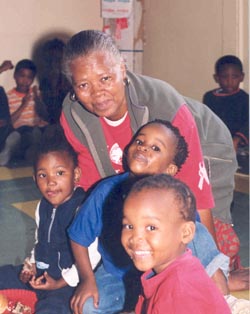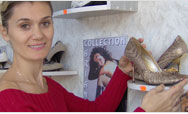You are here » Home » Telling Our Story
Success Story
Support groups care for orphans and children affected by HIV/AIDS
Learning to Cope with Loss in South Africa

| |
Photo: USAID/Reverie Zurba
|
|
A counselor works with AIDS-affected children at Jabavu Clinic in Soweto.
Throughout the sessions, the social workers guide the children to progressively get to know themselves and each other better so they can learn to talk about their experiences.
|
Ten-year-old J.J. is not HIV-positive, but his mother was. She died recently, and J.J. now lives with his grandmother, his aunt, his uncle and 10 other children. Living conditions are cramped and food is scarce. AIDS orphans face homelessness, social and economic problems, reduced access to education and healthcare, discrimination and exploitation. They are at high risk of developing AIDS themselves.
But J.J. has found care and support in a group he attends at Jabavu Clinic in Soweto, South Africa. Funded by USAID, Jabavu Clinic has been offering support groups for people affected by HIV/AIDS since 2000. Now, three more sites like it have opened in Soweto, as well as others in Alexandra, Durban,
Cape Town and Port Elizabeth.
J.J. initially came to Jabavu with his mother, who was attending a support group for HIV-positive adults. After she died, he began coming on his own, attending group sessions tailored to meet the needs of children like himself. During these sessions, directed by a social worker, J.J. is encouraged to express himself — not just verbally, but also through creative play.
All children affected by HIV/AIDS are welcomed
to Jabavu’s groups. When they first arrive, each child is interviewed individually
by a social worker to assess his or her specific needs and placed in a group. Each group session of 8–10 children is moderated by two clinic-trained social workers and lasts for an hour or two, each week for six weeks.
Throughout the sessions, social workers guide the children to progressively get to know themselves and each other better so they can learn to talk about their experiences.
The social workers then try to help the children address their anger and cope with it constructively, rather than by acting out inappropriately. The children also often need help exorcising any feelings of guilt or responsibility for a loved one’s death. At the end of the six weeks, the clinic throws a party to give the children closure, but encourages them to return to the clinic whenever they want. These support sessions help children become better able to express themselves and realize that they are not alone in facing difficulty and loss.
The program keeps a psychologist or social worker on staff to monitor and develop the program and train other staff members, and auxiliary social workers conduct the group sessions and provide counseling as needed. The clinic hopes to establish a referral system
to better coordinate needs and resources
of the community and other local clinics, support groups, hospitals and schools.
Print-friendly version of this page (228kb - PDF)
Click here for high-res photo
Back to Top ^ | 

